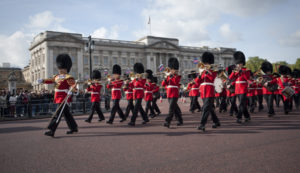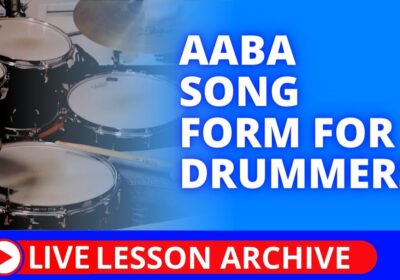Military Music Career
Get paid to play drums and travel the world
A military music career might not be something you’ve considered before. Most of us dream of playing music professionally, enjoying a secure salary, travelling the world, sharing the stage with the likes of Jools Holland and entertaining the Queen but surely this is just a dream unless you’re one of the lucky few?
Think again because this is exactly how the 833 musicians of the Corps of Army Music spend their working days. Spread across 23 bands, with another 20 territorial bands in addition, these players are living this dream every day with total job security in every sense.
 While the elusive ‘quick route’ to fame is pushed in our faces by the likes of X-factor, the military music career often slips under the radar, but there are a wealth of opportunities for young musicians in every style of music.
While the elusive ‘quick route’ to fame is pushed in our faces by the likes of X-factor, the military music career often slips under the radar, but there are a wealth of opportunities for young musicians in every style of music.
What does it involve?
As Corps of Army Music Warrant Officer Class One, Richard Allen explains, “A career in the Corps of Army Music can offer an instrumental performer an exciting and diverse professional vocation in a modern and stable environment.”
We’ve all witnessed the impressive changing of the guard ceremonies with mesmerising performances from one of the Guards bands, but the scope and diversity of music within the army stretches far beyond this. As Richard states, “Army musicians represent the public face of the Army, both at home and abroad. Although our bands are based on the Symphonic Wind Band we can produce many other musical groups to meet the demands of the wide variety of engagements that we are required to perform. In addition to Chamber Orchestras and Marching Bands there is also the opportunity to perform in many different musical combinations, such as Fanfare Teams, Dance Bands, Jazz & Dixie Bands, Folk groups, Big bands, Rock bands and Pop bands.”
What’s are the incentives?
Military music career life offers excellent incentives that aren’t available in most other careers, musically or otherwise. Beyond playing in some of the world’s greatest venues and earning musical qualifications such as diplomas or degrees, the job delivers sport and adventure training, a full time salaried and pensionable career up to the age of 55, a golden hello’ of £3,500 for graduates, with commitment bonuses up to £1500 and a bursary scheme for students on performance based courses in both Further and Higher education.
Do I have to kill people?
Of course, an army musician is part of the regular army and as such is required to do some military training to keep a level of fitness and weapons handling maintained. Richard tells us, “Our operational role is in support of the Army Medical Services, and therefore we spend time honing our Basic Casualty First Aid Drills. This is the same for every person in the Army. Everyone that joins must complete their military training and learn their basic survival skills. However, 95% of our time is spent on music.”
The initial training comes in two phases. The basic training in phase 1 lasts between 14 to 28 weeks and includes basic soldiering skills, map reading, signaling, marching, weapon handling, field craft, nuclear, biological and chemical personal protection skills as well as physical fitness, although there is nothing here that any reasonably fit young person cannot handle.
Phase 2, lasting for 11 to 44 weeks depending on musical ability, is largely music related and includes aural perception, theory of music, orchestration techniques, instrumental performance, general musicianship, performance skills, fitness, marching band and more military Training.
The Instrumental tuition is given to each musician at the excellent Royal Military School of Music at Kneller Hall, Twickenham, by a team of highly dedicated and experienced instrumental professors, many of which are key performers in the London based Orchestras.
So what does it take to become a professional army musician?
According to Richard, “Army Musicians need to be versatile and adaptable, both musically and in their personality. They need to be willing to try many different musical ensembles and combinations in addition to performing a broad range of repertoire. One of the beauties of our job is that there is no ‘typical day’ in the life of an Army musician. It can be tough with late nights and early mornings, but the reward is a challenging and stimulating career, being paid to do what you love; Music!”
Let’s talk money
Once accepted into the Corp of Army Music, a musician will enjoy the luxury of a salary, something which isn’t guaranteed in many areas of musical performance. This starts around £13,000 during training, rising to £16,200. On completion of training, musicians take their Trade Employment Qualification and the salary increases to £17,400. After 2 Years and further Trade Employment qualifications, musicians can earn in the region of £21,000, although there is potential to become the senior musician in the Corps, the Principal Director of Music with the rank of Lieutenant Colonel and a salary in the region of £64,000.
Try it without committing
However, you do not need to join the Army for life and you will be free to decide after serving only four years whether to stay in or to take your training and experience into a civilian career in music. But there are opportunities to get a taste for this career before committing.
The Corps of Army Music offers Insight (work experience) placements with most of their bands and also at the Royal Military School of Music, Kneller Hall. Insight courses usually run for 5 working days, although day visits are also available in some bands.
The courses are designed so that instrumentalists are able to gain a good insight into life as a musician within the Army, as well as observing the training processes of the musicians. During the course, performers are able to informally participate in the day to day working environment of a musician and join in any number of group rehearsals, possibly culminating in an engagement with a band.
The visits are primarily centred on music, which may involve anything from concert band rehearsals and marching band, to watching ‘Changing of the Guard’ at Buckingham Palace. There may also be some physical activities, including an introduction to military life, as well as social interaction with our musicians. These ‘insight’ courses are available to anyone over the age of 14, who play or sing to at least ABRSM grade 5 or equivalent standard. The courses, which are completely free, will provide an honest and realistic insight into army life within the Corps of Army Music.
Where do I start?
If a military music career path sounds appealing, the first step is a two day audition process. This takes a candidate through a theoretical paper which equates to ABRSM Grade 5 standard, an aural perception assessment, scales and a sight reading assessment. The candidate is then asked to prepare two contrasting pieces of music to play on their primary instrument and a secondary instrument if relevant. These pieces can be drawn for the ABRSM Grade 6 syllabus or higher.
Now at such a senior position within the Corps of Army Music, Richard says, “I have been an Army Musician for 24 years and feel every bit as excited about the job as the day I joined. During my career I have travelled widely including tours in Germany, Bosnia, Japan, Cyprus, France, Belgium, Prague, Egypt, USA, Canada, New Zealand and Finland. Highlights of my career include participating in 22 Queens Birthday Parades and sounding fanfares in London’s Guildhall on the occasion of the anniversary of VE Day in the presence of HM The Queen and 50 Heads of State from around the world. No two days are the same and this continually presents new challenges.”
And now you’re getting serious about drumming, don’t forget to click here to get FREE exclusive drumming content delivered to your inbox so you have plenty of inspiration when practising.
Further Information
This article is based upon the career found here.
There is another military option for drummers which you can find here.
Although this is UK based information you can find military music career opportunities within most national military organisations so if you like what you’ve read, do some research and see what ia available for you.
This article was originally written and published in Music Teacher magazine in 2009 so fees and details may alter over time. But this gives an overview of this career choice with the links above to explore further if you are interested.
As you love drumming, you may want to browse the other lessons available at Total Drummer. Check out the free lessons, single lessons, mini courses and main courses, as well as the drum less playalongs and the charts of famous songs.
Faster Hands in 7 Days FREE Drum Course
Improve your drum hand speed in a week to get Faster Hands
We all want faster hands on the drums but so many drummers I see are missing the basic aspects of drumming that will take them to the next level.
Many of those drummers are not lazy. In fact it’s the opposite. They are putting in the work but they are missing the fundamental techniques that will allow them to play faster and smoother. This leads to inevitable frustration and despondency.
In effect they are wasting their time!
By clicking below you can gain access to a FREE ‘7 days to faster hands’ drum course that will guarantee to raise your speed by the end or your money back (yes it is free so not the best guarantee ever!). But seriously, it will make a difference in a really short space of time.
But more than trying to create unrealistic miracles in a short space of time, it will also set up long term habits that will help you find your full potential as a drummer long into the future. And that is way more important.
It will show you:
- The fundamental techniques to play at your best level
- How to properly grip the sticks
- How to prepare yourself properly to drum
- How to make the stick do the work so you don’t have to
- How to set your drums up for optimum speed
- How to apply this around the kit
- Exercises to develop control as well as speed
- How to take this on into the future to become awesome!
And more than that you will also get a ton of other great free drum resources to make you a better drummer such as playalong tracks, articles, exclusive video lessons and more. And it’s all free!
Watch the video to get a feel for what the seven day course entails and then scroll down to get the course immediately.
Start today and build your hand speed up
So let’s start the course today. Do it now and begin your 7 day process to get faster hands. This time next week you’ll be enjoying the results and thinking about how you can take it to the next stage (by the way, the course helps with that too as we’ll be checking speed progress over the next 12 months).



